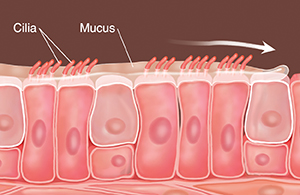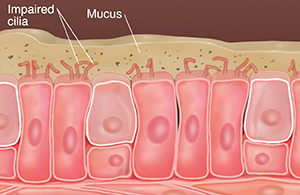COPD: Coping with Mucus
When you have COPD, you may be dealing with mucus. Mucus is a thick, sticky fluid. It's also known as sputum or phlegm. It's normal for the lungs to make some mucus. Mucus helps trap harmful particles in the air you breathe in. These particles are called irritants. They include things such as cigarette smoke, germs, dust, and chemicals.
Inside the lungs, air moves through tubes called airways. In healthy lungs, tiny hairs line the airways. These hairs are called cilia. They sweep mucus up to the throat. Then the mucus and irritants are coughed or sneezed out or swallowed. This helps to protect the lungs and the airways.
How does COPD cause mucus?
With COPD, lungs and airways don't work the way they should. The airways become damaged because of swelling in airway lining. They also make more mucus. This clogs the airways. The damage is most often caused by breathing in irritants over a long period of time. The main irritant that causes COPD is cigarette smoke.
COPD is a term for two main conditions. These are chronic bronchitis and emphysema. With chronic bronchitis, the irritated airways swell. The muscles that surround the airways may tighten. The damaged airways also make more mucus than normal. They do this to try to clear the irritants away. But the mucus builds up. This can cause an ongoing (chronic) cough as the body tries to remove mucus. The extra mucus and the swollen, tight airways make it harder to breathe. This is because the airways are blocked and narrowed. Less air gets in and out of the lungs.
Smoking also damages or destroys the cilia in the airways. Damaged cilia can’t move. So the mucus, smoke, and other particles can’t be swept out of the lungs. As a result, germs aren’t cleared away. Then the lungs are more likely to become infected. Lung infections can make COPD symptoms worse.
 |
| Healthy airway. |
 |
| Airway with COPD. |
Treatment for mucus
There is no cure for COPD other than lung transplant. But certain treatments help manage symptoms of COPD, such as extra mucus:
-
Bronchodilators. These medicines help open the airways. This makes it easier to clear mucus from the lungs. Most bronchodilators are taken with an inhaler. This allows the medicine to go straight to the lungs. Bronchodilators can also be given in a nebulizer machine.
-
Combination medicines. These include a bronchodilator and a steroid. Steroids reduce swelling and inflammation that cause you to make mucus. This keeps the airways from getting irritated.
-
Antibiotics. A respiratory infection can lead to more mucus and coughing. Antibiotics are medicines that help treat infections.
-
Mucolytic medicines. These medicines manage excess mucus by thinning the mucus, making it easier to cough up.
Your healthcare provider will work with you to decide on the best treatment plan for you.
Self-care tips for mucus
There are ways to reduce mucus. These include:
-
Stop smoking. Cigarette smoking is the main cause of COPD. Stopping smoking is the most important step you can take to treat COPD. As soon as you quit, your body begins to repair the damage caused by smoking. If you need help stopping smoking, talk with your healthcare provider.
-
Stay away from secondhand smoke and other irritants. Try to stay away from smoke, chemicals, fumes, pollen, and dust. Don’t let anyone smoke in your home or around you. Stay indoors on smoggy days.
-
Prevent lung infections. Get vaccines as directed by your provider. Having COPD increases your risk for flu and pneumonia. Ask your healthcare provider about the flu and pneumonia vaccines. Take steps to prevent colds and other lung infections. Stay away from crowds during cold and flu season, and avoid others who are sick.
-
Practice correct handwashing. This helps prevent infections. Wash your hands often with soap and water for at least 20 seconds. Use hand sanitizer with at least 60% alcohol when you can’t wash your hands.
-
Limit dairy products. Dairy products can increase mucus. Enjoy milk, ice cream, and cheese in small amounts.
-
Drink plenty of water. This helps make mucus thinner and easier to cough up. Ask your healthcare provider how much water you should drink. For many people, 6 to 8 glasses (8 ounces each) a day is a good goal.
-
Clear your airway. When your lungs make a lot of mucus or it's hard to cough up, airway clearing techniques can help. These include coughing techniques and postural drainage. Keeping your lungs clear of mucus helps prevent shortness of breath and other symptoms. Ask your healthcare provider about these techniques.
-
Don’t be afraid to be active. Being active may make you short of breath. Exercise can strengthen the muscles that help you breathe Ask your healthcare provider about the right amount and type of safe exercises for you.
When to call your healthcare provider
Call your healthcare provider or seek medical care right away if you have any of these problems:
-
Fever of 100.4°F (38°C) or higher, or as directed by your healthcare provider
-
Symptoms that don’t get better, or get worse
-
New symptoms